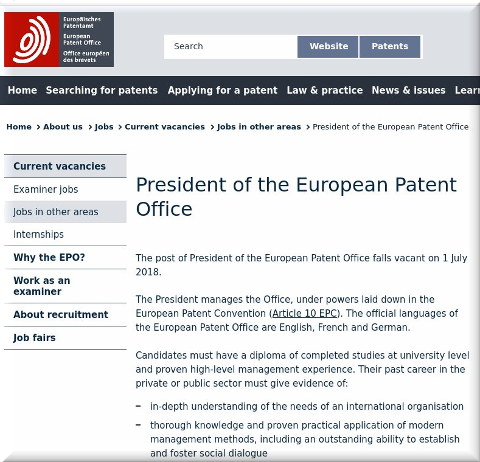

EARLIER today we wrote about the final day of strike and the lack of independence that ensues (not just judges' independence). Well, one thing the staff is almost guaranteed to have before the next Independence Day is independence from Battistelli (albeit not Team Battistelli, which might occupy the same position by succession).
epo.org
The post of President of the European Patent Office falls vacant on 1 July 2018.
The President manages the Office, under powers laid down in the European Patent Convention (Article 10 EPC). The official languages of the European Patent Office are English, French and German.
Candidates must have a diploma of completed studies at university level and proven high-level management experience.
That discussion is to test the "imbalance" argument of Bross. ("A further point was the unjust imbalance...")
It seems to me Bross is arguing that even if the EPO boards were a court, the imbalance caused by the opponent getting two shots would be sufficient to render the EP/DE system as a whole unconstitutional.
Now replace EPO boards with BPatG and the argument applies in just the same way to the DE/DE system.
His other arguments also seem flawed. Whatever problem there may be with the EPO (or not), from a German national point of view it logically cannot affect the constitutionality of the UPC/unitary patent more than it affects the constitutionality of the EP/DE system. The role of the EPO is exactly the same in both systems.
Anon - all of the previous legislative steps that you mention occurred prior to both the EU referendum and the triggering of Article 50. Thus, given that the UPCA requires its PMSs to be EU Member States, one would have thought that it would be eminently sensible for the JCSI (and/or the committee of the commons or Lords) to conduct a quick check of whether the UPCA stands any chance of surviving.
Whichever way you cut it, the current UPCA is unworkable post-Brexit. Given that there is no amended UPCA (nor any prospect of such an amended Agreement being drafted, agreed and ratified in the near future), why on earth would Parliament contemplate giving the government the green light to ratify something that looks like it will be pronounced (by the CJEU) dead on arrival?
If your argument is merely that procedural rules prevent the various committees applying common sense, then what does that say about the current rules? Personally, I would have thought that the unexpected arrival of an existential threat to the UPC (ie Brexit) justifies "bending" the rules a little to allow for an assessment of the UPCA's chances of survival.